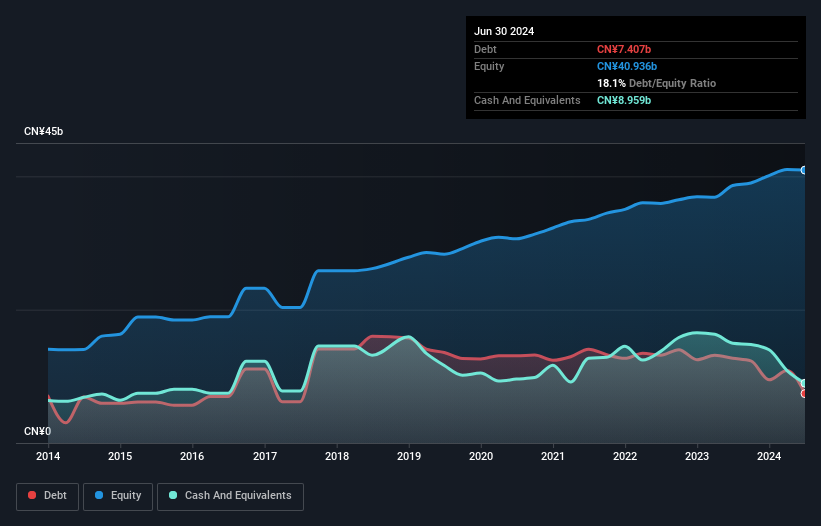Howard Marks put it nicely when he said that, rather than worrying about share price volatility, 'The possibility of permanent loss is the risk I worry about... and every practical investor I know worries about.' So it might be obvious that you need to consider debt, when you think about how risky any given stock is, because too much debt can sink a company. As with many other companies Sinotrans Limited (HKG:598) makes use of debt. But should shareholders be worried about its use of debt?
Why Does Debt Bring Risk?
Generally speaking, debt only becomes a real problem when a company can't easily pay it off, either by raising capital or with its own cash flow. If things get really bad, the lenders can take control of the business. However, a more usual (but still expensive) situation is where a company must dilute shareholders at a cheap share price simply to get debt under control. Of course, debt can be an important tool in businesses, particularly capital heavy businesses. When we examine debt levels, we first consider both cash and debt levels, together.
Check out our latest analysis for Sinotrans
How Much Debt Does Sinotrans Carry?
The image below, which you can click on for greater detail, shows that Sinotrans had debt of CN¥7.41b at the end of June 2024, a reduction from CN¥12.7b over a year. But on the other hand it also has CN¥8.96b in cash, leading to a CN¥1.55b net cash position.

A Look At Sinotrans' Liabilities
We can see from the most recent balance sheet that Sinotrans had liabilities of CN¥30.2b falling due within a year, and liabilities of CN¥6.38b due beyond that. Offsetting these obligations, it had cash of CN¥8.96b as well as receivables valued at CN¥20.4b due within 12 months. So its liabilities outweigh the sum of its cash and (near-term) receivables by CN¥7.16b.
Given Sinotrans has a market capitalization of CN¥35.8b, it's hard to believe these liabilities pose much threat. But there are sufficient liabilities that we would certainly recommend shareholders continue to monitor the balance sheet, going forward. Despite its noteworthy liabilities, Sinotrans boasts net cash, so it's fair to say it does not have a heavy debt load!
The modesty of its debt load may become crucial for Sinotrans if management cannot prevent a repeat of the 25% cut to EBIT over the last year. When it comes to paying off debt, falling earnings are no more useful than sugary sodas are for your health. There's no doubt that we learn most about debt from the balance sheet. But it is future earnings, more than anything, that will determine Sinotrans's ability to maintain a healthy balance sheet going forward. So if you want to see what the professionals think, you might find this free report on analyst profit forecasts to be interesting.
Finally, a business needs free cash flow to pay off debt; accounting profits just don't cut it. Sinotrans may have net cash on the balance sheet, but it is still interesting to look at how well the business converts its earnings before interest and tax (EBIT) to free cash flow, because that will influence both its need for, and its capacity to manage debt. Over the last three years, Sinotrans recorded free cash flow worth a fulsome 93% of its EBIT, which is stronger than we'd usually expect. That positions it well to pay down debt if desirable to do so.
Summing Up
Although Sinotrans's balance sheet isn't particularly strong, due to the total liabilities, it is clearly positive to see that it has net cash of CN¥1.55b. And it impressed us with free cash flow of CN¥144m, being 93% of its EBIT. So we are not troubled with Sinotrans's debt use. The balance sheet is clearly the area to focus on when you are analysing debt. However, not all investment risk resides within the balance sheet - far from it. These risks can be hard to spot. Every company has them, and we've spotted 2 warning signs for Sinotrans you should know about.
At the end of the day, it's often better to focus on companies that are free from net debt. You can access our special list of such companies (all with a track record of profit growth). It's free.
New: Manage All Your Stock Portfolios in One Place
We've created the ultimate portfolio companion for stock investors, and it's free.
• Connect an unlimited number of Portfolios and see your total in one currency
• Be alerted to new Warning Signs or Risks via email or mobile
• Track the Fair Value of your stocks
Have feedback on this article? Concerned about the content? Get in touch with us directly. Alternatively, email editorial-team (at) simplywallst.com.
This article by Simply Wall St is general in nature. We provide commentary based on historical data and analyst forecasts only using an unbiased methodology and our articles are not intended to be financial advice. It does not constitute a recommendation to buy or sell any stock, and does not take account of your objectives, or your financial situation. We aim to bring you long-term focused analysis driven by fundamental data. Note that our analysis may not factor in the latest price-sensitive company announcements or qualitative material. Simply Wall St has no position in any stocks mentioned.
About SEHK:598
Sinotrans
Provides integrated logistics services primarily in the People’s Republic of China.
Flawless balance sheet, undervalued and pays a dividend.
Similar Companies
Market Insights
Community Narratives




